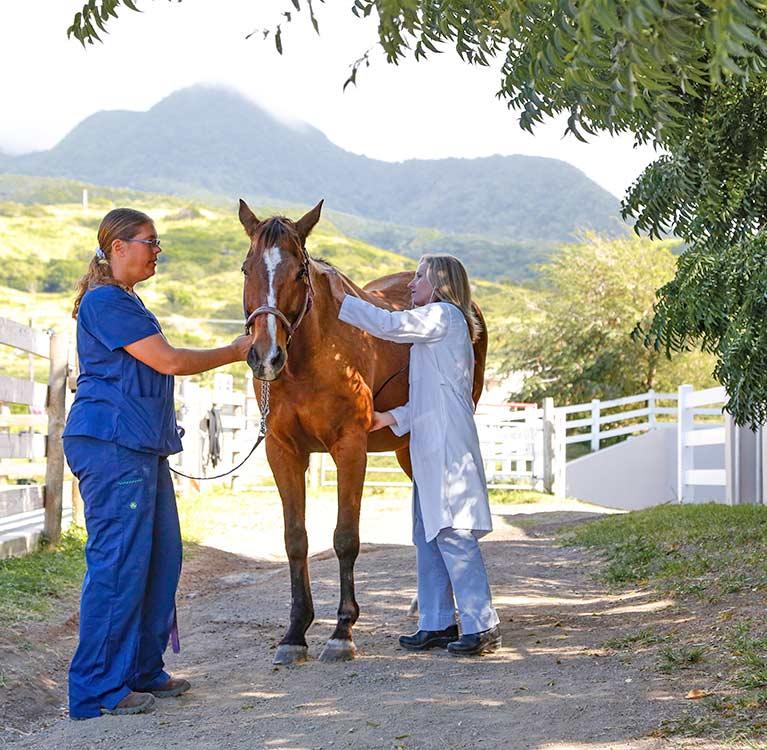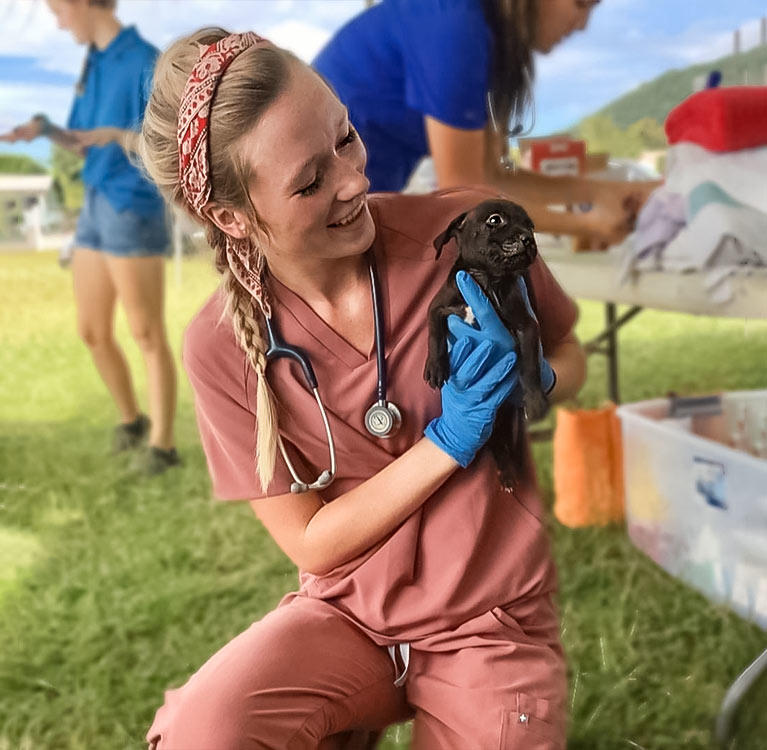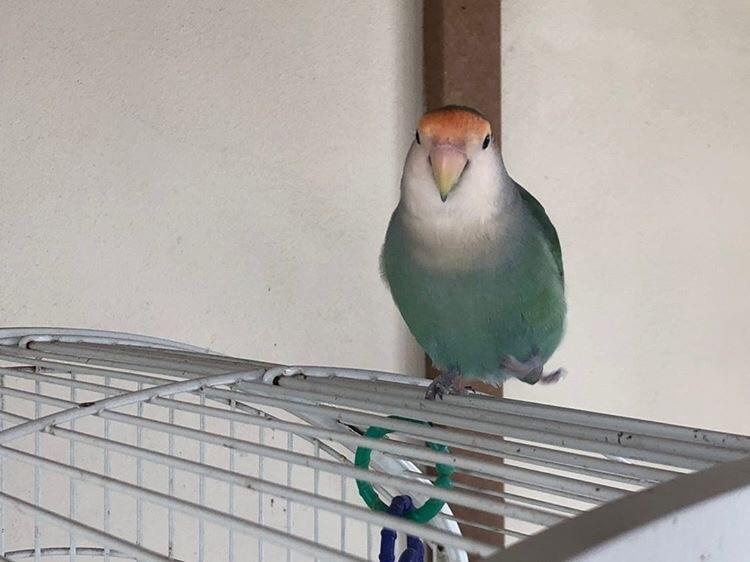Do you prefer to work independently or working as part of a team? Does a life in the country appeal to you? Maybe it’s the economics and science of our food supply that interests you. If you you’re shaking your head yes, then life as a large animal veterinarian may be your calling.
Working with livestock or large animals is nothing like working with companion animals. According to Dr. Ailbhe King, MVB and Assistant Professor of Production Animal Medicine at Ross University School of Veterinary Medicine (Ross Vet), “Aside from the obvious differences in species, the disciplines are like two separate worlds. Large animal veterinarians must tend to the animals in their care so that livestock owners can meet economic and profit goals. Companion animal vets must maintain the health of the pets in their care who are considered part of a family.” The first answers not only to the farmer/owner but to a massive food supply chain. The second answers to pets and their owners.
What Does a Large Animal Veterinarian Do?
Food animal veterinarians treat a host of species such as cattle, pigs, sheep, and goats. They are involved in both preventative and curative medicine. On the farm, veterinarians vaccinate food animals against disease, treat them when they are sick, perform surgeries, and consult with farmers on management practices and nutrition. On larger farms, they may work as part of a team of herdsmen and nutritionists. They also make sure that the food these animals provide is safe for people to eat. Says Dr. King, “The growing concern around antimicrobial resistance in human medicine means that food animal veterinarians play a critical role in promoting and practicing antimicrobial stewardship.”
There are also equine veterinarians who only treat horses, and may spend their days at a ranch, stable, or racetrack. Similarly, they vaccinate against disease, treat horses when they are sick with common ailments including colic, lameness, and metabolic disease. Some large animal veterinarians may treat both food animals and horses.
A day in the life of a large animal veterinarian
A typical day for a large animal vet often includes scheduled visits for fertility and health management checks. Fertility and pregnancy checks are usually performed by rectal palpation and in some cases, the use of ultrasound technology. While on the farm, large animal veterinarians tend to sick animals and often perform surgeries.
Says Dr. King, “There is always a chance that someone will call with an emergency when you are in the middle of something. So, large animal vets often participate in farm management meetings to help educate farm personnel about how to perform routine procedures.” They also consult on how to improve management to decrease morbidity. On-farm, the vets write standard operating procedures (SOPs) which are instructional guides on how to approach and treat common problems that arise.
“I decided to choose the large animal path as I love the species and I particularly enjoy working with farmers/producers. As large animal vets, we can get to know our clients better, as in many cases routine visits are scheduled anything from weekly to monthly. I also grew up on a beef farm in rural Ireland and so was exposed to cattle from a young age.”
Being a Large Animal Veterinarian
Dr. Roger S. Hancock, DVM, RN and Clinical Instructor-Large Animal at Ross Vet is a food animal vet. Before making the move to teaching large animal veterinary medicine, he worked on dairy farms. As he puts it, “I did a bit of everything, caring for dogs and cats who lived on farms, as well as small ruminants. I even cared for some small pocket pets like tropical fish that farmers kept in aquariums.”
Food animal veterinarians focus primarily on production medicine. Unlike companion animal vets, large animal veterinarians must give a lot more consideration to economics. This entails being aware of food safety and the use of antibiotics as these are major considerations for the food chain. Says Hancock, “Typically, we have fewer clients, more ‘after work’ hours on call, and more time spent outside in all kinds of weather treating much larger patients.”
“A day may entail going to a dairy to check cows for pregnancy, fertility exams, vaccinate and dehorn calves. Then you move on to perform a surgery on a cow to repair a displaced abomasum. After surgery, you visit someone’s back yard to see a lame goat. And then it’s back to the clinic to castrate a pet goat kid. And maybe you get called out in the middle of the night to do a calving.”
When asked about pursuing large animal medicine, Dr. Hancock gives this advice, “Start with your DVM. Make sure you can tolerate looking thru a windshield (you’ll spend lots of time on the road), have a genuine interest in working on farms, and be willing to get dirty. Food animals are important to everyone. The fact is, dairies and cattle ranches are businesses, and you need to make appropriate decisions that benefit our food supply.”
Other types of large animal practices
Hancock has worked for all four zoos in western Washington state. “This is a very interesting specialty, and the range and exotic types of species you encounter are broad, interesting, and sometimes dangerous. Adds Hancock, “Most zoo vets will tell you that no day is the same, and I found this to be true. Here’s a story that stands out during my time in this large animal specialty…
“On July 12, 2012, I got a call in the middle of the night. It seems an agile Bobcat made it through the outer fence at the Munroe Corrections Complex — that’s right, a prison. The cat made it up to the roof of the “Special Offenders unit.” I was called in to help the cat ‘escape’ unharmed. It had suffered cuts pushing through the razor wire. So, I had to shoot the bobcat with a tranquilizer gun, take him to a rescue center and stitch him up. A few days later he was released to the wild. You’ll enjoy this: A spokesperson for the prison said, “If we had an inmate the same size as a bobcat and with the same level of dexterity, we’d have a problem.””
Meet Valerie Morales Coll, B.S., 4th- year Doctor of Veterinary Medicine (DVM) candidate at Ross University School of Veterinary Medicine
Currently, in her fourth year, Valerie is completing a dual-degree program, working toward earning a Master of Science (MSc) and DVM. She is leaning towards large animal veterinary medicine with an interest in the equine specialty. “I always had an interest in horses and have ridden my whole life, but I’m still in the deciding phase,” she told us.
What are the qualifications for a specialty in large animal veterinary medicine?
Says Valerie, “After graduating with your DVM, you have to do an internship, and for that, you’ll need letters of recommendation. Good grades are a must and having research experience helps a lot. Available research opportunities are a big plus of Ross Vet– the more you do the better. The best way to find opportunities is by asking faculty members. Sometimes a professor will send out emails announcing research opportunities.”
“Then you’ll have to do a residency program that really helps you learn how to be a large animal vet. Students need to be academically proficient and show involvement in outside activities while in veterinary school.” As an aside, Valarie has served as President of the Equine Club at Ross Vet.
What kind of organizations hire large animal veterinarians?
“There is quite a range of potential jobs for large animal specialists,” adds Valarie “everything from farm and food vets to zoologists. For equine medicine, you might get a job in private practice which offers the most options. For instance, you can be part of a private equine hospital where you may have as many as 20 vets. You also have companies like race- tracks, or big companies that hire veterinarians such as pharmaceutical and biotechnology firms.”
Your Career Path
The world of large animal veterinary medicine provides a large variety of opportunities, everything from working on a farm to working on a zoo.
Interested in pursuing your dreams of working with large animals?








